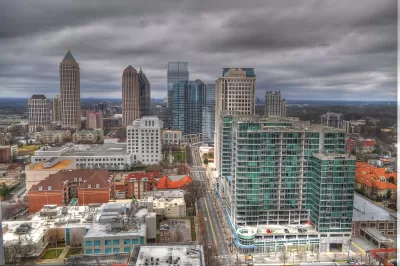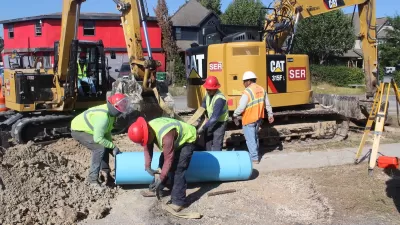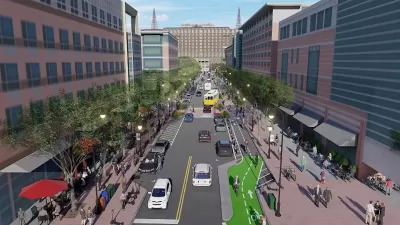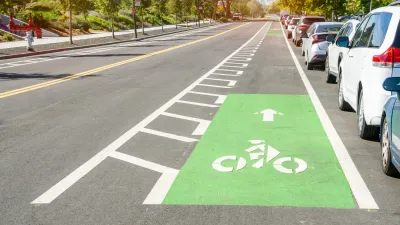Rather than committing to a new direction for urban design, Atlanta is backpedaling on a 'people-friendly' makeover on three blocks of Peachtree Street.

A pedestrian-oriented pilot project on Atlanta's Peachtree Street will soon disappear, despite early promises that the project would "signal 'the beginning of a cultural shift' in terms of how intown public space is utilized," writes Josh Green. "Applauded by urbanists, the initiative was described as the first step toward making that stretch of Peachtree a curbless, permanently shared space."
"Building on an Atlanta City Studio concept from 2018, the initiative installed small removable barriers and verdant planters to open up street lanes for pedestrians, bicyclists, and e-scooter riders, spanning from Baker to Ellis streets in front of marquee hotels and numerous restaurants and office towers." Now, "All planters, signage, wheel stops, and other elements of the planning department’s shared space project will be pulled."
"Sources including downtown residents indicate that Richard Bowers, president of commercial real estate firm Richard Bowers and Co., opposed the changes to Peachtree Street and was influential in the city’s decision to remove shared lanes."
The article notes that the city's planning department and Bowers have not responded to requests for comment. "But Amir Farokhi, Atlanta City Councilor for downtown’s District 2, confirmed the plans and said his efforts to keep the demonstration project in place were ultimately fruitless."
FULL STORY: City plans to remove people-friendly project on Peachtree Street

Trump Administration Could Effectively End Housing Voucher Program
Federal officials are eyeing major cuts to the Section 8 program that helps millions of low-income households pay rent.

Planetizen Federal Action Tracker
A weekly monitor of how Trump’s orders and actions are impacting planners and planning in America.

Ken Jennings Launches Transit Web Series
The Jeopardy champ wants you to ride public transit.

Washington Legislature Passes Rent Increase Cap
A bill that caps rent increases at 7 percent plus inflation is headed to the governor’s desk.

From Planning to Action: How LA County Is Rethinking Climate Resilience
Chief Sustainability Officer Rita Kampalath outlines the County’s shift from planning to implementation in its climate resilience efforts, emphasizing cross-departmental coordination, updated recovery strategies, and the need for flexible funding.

New Mexico Aging Department Commits to Helping Seniors Age ‘In Place’ and ‘Autonomously’ in New Draft Plan
As New Mexico’s population of seniors continues to grow, the state’s aging department is proposing expanded initiatives to help seniors maintain their autonomy while also supporting family caregivers.
Urban Design for Planners 1: Software Tools
This six-course series explores essential urban design concepts using open source software and equips planners with the tools they need to participate fully in the urban design process.
Planning for Universal Design
Learn the tools for implementing Universal Design in planning regulations.
Heyer Gruel & Associates PA
Ada County Highway District
Institute for Housing and Urban Development Studies (IHS)
City of Grandview
Harvard GSD Executive Education
Toledo-Lucas County Plan Commissions
Salt Lake City
NYU Wagner Graduate School of Public Service





























